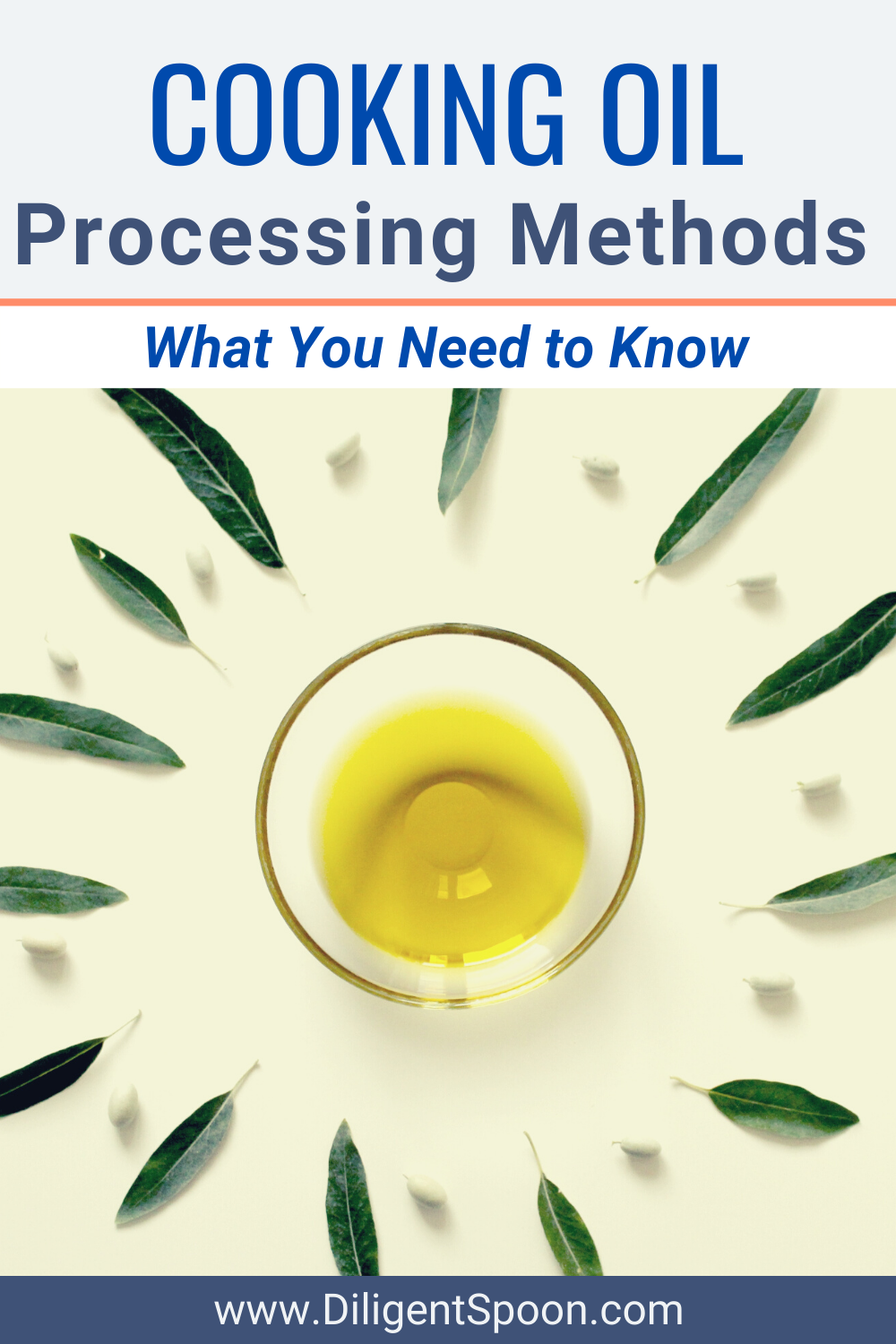
Quick Guide to Cooking Oil Processing: What You Need to Know
Expeller-pressed, cold-pressed, extra virgin, extra light, RBD …
Have you ever wondered “What the difference?” between all these labels on your favorite brand of olive or canola oil?

There are several edible (not to be confused with inedible 😉 ) oil processing methods, and the labeling for these oils is confusing. For instance, “expeller-pressed” vs “RBD” – not exactly layman’s terms! If you know a little about the different methods, you can choose the oil that is not only the tastiest, but the best for what you want to use it for.
Trivia Question
What’s the difference between cold-pressed and extra-virgin olive oil (EVOO)? 🤔
** Answer at the very end of the post.
Three Standard Categories
Although there are more processing methods out there, these are the three that seem to be the most commonly-seen on labels. In the following sections, they are listed in order of least processed to most processed.
Least Processed –> Cold-pressed oil
Basic idea – no heat created and no chemicals added
Cold-pressed oils must be produced below 120° F (this temperature varies slightly across countries) and are unrefined oils that are not heated later during the refining process. The cold-pressing process includes methods such as:
- Stone grinding or milling, such as crushing of olives for olive oils.
- Compressing fruits, like olives and avocados, to squeeze the oil out.
- All cold-pressing methods are done at a very slow rate, to keep the temperature below 120° F.
The cold-pressing process typically removes the least amount from the oil from the seed or fruit, making it the least efficient process. This is the main reason cold-pressed oils are usually the most expensive.
Health Claims
Cold-pressed oils retain more naturally-occurring nutrients and antioxidants from the seed or fruit (because these oils are not heated or treated with chemicals).
Best uses
Cold-pressed oil is best for recipes when you want to taste the flavor of the oil. Also, these oils are best used in foods that will not be cooked, because heat can destroy antioxidants, nutrients, and flavors in the oil. (Basically, burning away the extra $$ you spent!). Some popular uses:
- Salad dressings and marinades. EVOO is the traditional option and adds a fruity or spicy flavor to vinaigrettes (like this one that I make). If you don’t want to taste the oil in your salad dressing, go for a neutral-flavored cold-pressed oil, such as grapeseed oil.
- Dipping oil. This is the oil that you dip your bread in. EVOO or flavored oils are best for dipping.
- Frozen treats. Coconut oil is especially good for these.
- Finishing and drizzling over ready-to-eat dishes.
Example oils: Cold-pressed EVOO, avocado oil, coconut oil, flaxseed oil

Expeller-pressed oil
Basic idea – heat created but not added, no chemicals added
Expeller pressing uses (somewhat obviously) a press to squeeze the oil out of the fruit or seed without using solvents or other chemicals (like hexane).
- An oil press is usually a screw-type machine that presses oil through an opening using friction and pressure. The screw drives forward to squeeze the oil from the fruit or seeds.
- Pressure and friction of pressing the fruit creates heat – the temperature is typically 140-210’F. So, this process is not cold-pressed because the oil doesn’t stay cool, even though no heat is added.
Expeller pressing is more efficient than cold pressing. It gets 87-95% of the oil out of the seed/fruit. As a result, expeller-pressed oils tend to be less expensive than cold-pressed (more oil is produced from the same amount of seed).
Health Claims
No chemicals are added in production. So, these are good oils to use if you’re trying to avoid chemically-processed foods.
Best uses
- Sauteing, cooking, baking
- Salad dressing and marinades where you do not want to taste the oil
Example oils: Expeller-pressed avocado, olive, coconut, most seed oils (canola, safflower, etc.)
Highly Processed – Refined oil
Basic idea – heat and/or chemicals added
- The seeds or kernels are first ground up into a paste.
- Next, those ground-up seeds are washed or purged with a solvent such as hexane to release the oil in the seed.
- The solvent is removed from the oil with heat and distilling, until there are no traces of solvent left in the oil.
- Lastly, the oil likely goes through a final process called RBD (refining, bleaching, deodorizing). This process is what gives these oils (canola, safflower, refined olive) their light color and odorless, tasteless qualities.
Solvent expelling gets 97-99% of the oil out of the seed, making it the most efficient way to get all the oil from the seeds. Therefore, refined oils are the least expensive.
Health Claims
Refined oils often make health claims associated with the makeup of the oil itself. For example, canola oil is advertised as a healthy oil because it is very low in saturated fat.
Best uses
- Sauteing, cooking, baking
- High heat roasting
- Frying
Example oils: canola, soybean, sunflower, safflower, vegetable oil blends

A Note about Smoke Point
Smoke point is the temperature at which the fat in oil begins to break down (and oxidize). This temperature is important because carcinogenic compounds (eg, cancer-causing) can form when oil is heated repeatedly over the smoke point. So, for the best taste and nutrition, oil shouldn’t be heated above its smoke point.

For instance, cold-pressed oils with lower smoke points make nice finishing oils, dressings, sauces or dips. Conversely, oils with higher smoke points are best for roasting, baking, frying and sautéing.
Generally, more refined oils have higher smoke points than less refined oils. That being said, there are a few exceptions – expeller-pressed avocado oil has a smoke point of 500’F!
Example: Safflower oil smoke points
- Cold-pressed / unrefined: 225’F
- Refined / highly-processed: 510’F.
Takeaways
Here are the main points to remember for each of the three processing methods.
Cold-pressed oils:
- Are the least refined – no chemicals or heat
- Retain flavor, nutrients, and antioxidants
- Are more expensive
- Have the lowest smoke point (as low as 200’F).
- Best in foods that will not be heated, like dressings and drizzles.
Expeller-pressed oils:
- Have no chemicals added
- Have less flavor and retain fewer nutrients/antioxidants than cold-pressed oils.
- Are less expensive than cold-pressed and more expensive than refined oils.
- Have higher smoke points (350′ – 450’F; avocado oil is over 500’F)
- For use in all food preparation, except deep frying.
Refined oils:
- Treated with heat, solvents, and/or other chemicals.
- Tend to have little or no flavor.
- Are the least expensive.
- Have the highest smoke points (up to and over 500’F)
- Can be used in all food preparations, including deep frying.
Trivia Question – Answer
What’s the difference between cold-pressed olive oil and EVOO?
Answer: Nothing!
All EVOO is cold-pressed. In addition, cold-pressed olive oil goes through another certification process to be considered extra-virgin olive oil. Any olive oil that doesn’t meet the EVOO standard is then refined, so it will no longer be cold-pressed. Confusing, no?







One Comment
Pingback: